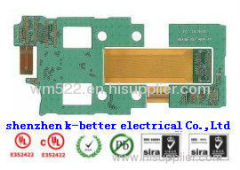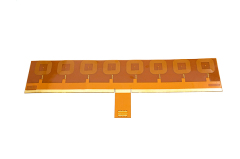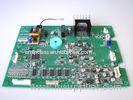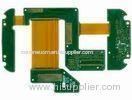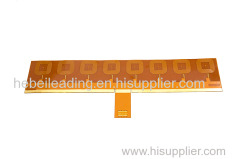
Fastlink Electronics Flex PCB
| Place of Origin: | Guangdong |
|---|
Company Profile
| Location: | Shenzhen, Guangdong, China (Mainland) |
|---|---|
| Business Type: | Manufacturer |
Product Description
Single layer to 12 flex pcb layers manufacturing service. Different stiffener materials: Fr4, PI, Aluminum, different flex materials such as Doupont, Panasonic etc are available.
A flexible board is made of flexible insulating material, which has many advantages that a rigid printed circuit board does not have. For example, it can be freely tortuous, winding, and folding, can be arbitrarily organized according to the spatial layout requirements, and can be arbitrarily moved and expanded in three-dimensional space, and then reach the integration of components and wire connections. Using FPC can greatly reduce the volume of electronic products, suitable for electronic products with high density, miniaturization, and high reliable direction development needs. Therefore, FPC has been widely used in aerospace, military, mobile communications, portable computers, computer peripherals, PDA, digital cameras (security camera circuit board), and other categories or products. As a flexible circuit board supplier, flexible circuit board factory, Fastlink can provide high-quality flexible circuit board manufacturing and assembly services.
What is Flexible Printed Circuits Boards?
Flexible Printed Circuits (FPCs), also known as flexible circuit board china or soft boards, are a reliable type of flexible circuit board design made of polyimide or polyester film. FPCs are designed to be flexible, allowing them to bend, fold or twist during use, unlike rigid boards. This flexibility provides design engineers with the ability to fold or twist the flexible layers to meet design objectives, making it an extremely useful function for various applications.
Multilayer FPCs are a flexible and cost-effective alternative to flat cable and costly connector integration methods. They are made using adhesive and adhesiveness type polyimide (PI) film substrates that are bonded together with or without air gaps for conformal installation. The thickness of copper ranges from 18 um to 140 um, and there are options for conventional plated hole or Vias circuit protection, as well as overlay and flexible LPI solder mask circuit protection.
FPCs are excellent for dissipating heat without requiring cooling on both sides, making them optimal for thermal management. Customized solutions include flat-flex, super-flex, and ultra-flex cable in single-sided, double-sided, or multilayer configurations.
Multilayer FPCs are flexible circuits that consist of three or more flexible conductive layers. Fastlink-electronics, as a trusted flexible circuit board manufacturer, can provide various types of multilayer flex PCBs for different projects. Our team of experts has extensive experience in designing and producing high-quality FPCs that meet the specific needs of our customers.
By choosing multilayer FPCs, customers can benefit from their flexibility, cost-effectiveness, and excellent thermal management properties. Fastlink-electronics is committed to providing reliable and innovative FPC solutions that meet the needs of our customers.
Design and Manufacturing of Flexible PCB
Design and manufacturing of flexible printed circuit boards (FPCs) require careful consideration of several factors to ensure that the final product meets the desired performance and reliability standards. Here are some of the key aspects of the design and manufacturing process for FPCs:
Design Considerations
Flexibility:
The design of an FPC should take into account the intended degree of flexibility required for the application.
Trace Routing:
The routing of traces on an FPC should be carefully planned to minimize signal loss and ensure proper electrical performance.
Component Placement:
The placement of components on an FPC should be optimized for space efficiency, signal integrity, and thermal management.
Environmental Factors:
The design of the FPC should consider the environmental factors such as temperature, humidity, and chemical exposure that the board will face during use.
Manufacturing Process
Substrate Material Selection:
The selection of the appropriate substrate material is critical to the success of manufacturing an FPC. The most commonly used substrate materials are polyimide (PI) and polyester (PET).
Etching:
The process of etching is used to remove excess copper from the FPC, leaving behind the desired pattern of traces.
Drilling:
Holes or vias are drilled into the FPC to allow for component placement and electrical connectivity between layers.
Plating:
After etching and drilling, the FPC is plated with a layer of metal such as copper to improve the conductivity of the circuitry.
Lamination:
The layers of the FPC are laminated together using heat and pressure to form a flexible and durable PCB.
Quality Control
Testing:
FPCs should be thoroughly tested to ensure that they meet the desired performance and reliability standards.
Inspection:
Visual inspection should be carried out to identify any defects or issues that might affect the performance of the FPC.
Documentation:
Proper documentation of the manufacturing process and test results should be maintained to ensure traceability and accountability.
In a word, the design and manufacturing of FPCs require careful planning, attention to detail, and adherence to quality standards to ensure that the final product meets the desired performance and reliability standards. By working with a excellent FPC manufacturer-Fastlink, designers can create customized FPCs that are optimized for their specific applications, providing superior performance and reliability.
Materials for Manufacturing Flexible PCBs
Flexible PCBs (FPCs) are made of a variety of materials, each with its own unique properties and advantages. Some of the most common materials used in the manufacturing of FPCs include:
Polyimide (PI):
Polyimide is a popular material for FPCs due to its excellent thermal stability, high tensile strength, and excellent electrical insulation properties. PI is also highly resistant to chemicals and radiation, making it ideal for use in harsh environments.
Polyester (PET):
Polyester is another common material used in the manufacturing of FPCs. PET offers good dimensional stability, flexibility, and excellent resistance to tear and abrasion. However, PET has lower thermal stability and electrical insulation properties compared to PI, making it less suitable for high-temperature applications.
Liquid Crystal Polymer (LCP):
LCP is a high-performance thermoplastic material that offers excellent mechanical strength, chemical resistance, and thermal stability. LCP is also highly resistant to moisture and is an ideal material for FPCs used in harsh environments.
Adhesiveless copper-clad films:
Adhesiveless copper-clad films are a type of FPC material that consist of a copper layer bonded directly to a polyimide or polyester substrate. These films offer excellent flexibility, thermal stability, and electrical performance, making them ideal for use in high-performance FPC applications.
Conductive inks:
Conductive inks are a type of FPC material that can be printed onto a flexible substrate using inkjet or screen printing techniques. These inks typically consist of conductive particles such as silver or copper suspended in a polymer matrix. Conductive inks are highly flexible and can be used to create FPCs with complex shapes and patterns.
The choice of FPC material will depend on the specific requirements of the application, including thermal management requirements, electrical requirements, mechanical requirements, and environmental conditions. By selecting the right FPC material, designers can create flexible circuits that are optimized for their specific applications and deliver superior performance and reliability.
Why Choose Fastlink-electronics Flexible PCB Manufacturing Services?
Our company has established a competitive advantage in the PCB industry by leveraging our extensive knowledge and experience in manufacturing flexible printed circuit boards. We are committed to providing unparalleled customer service and a competitive pricing structure, while also offering the flexibility of no minimum order quantity requirements.
To ensure that we meet the highest standards of quality, our experienced team carefully examines each design prior to production and reviews it with our customers. This allows us to identify any potential issues and ensure that the circuit design is optimized for manufacturing, resulting in high-performing and reliable boards.
At our company, we use only high-quality flex PCB parts and components, ensuring that our products meet the expectations of our customers. If you have any questions or concerns regarding our products or services, our team is always available to provide support and guidance. Simply reach out to us via email, and we will be happy to assist you.
Our commitment to quality and customer satisfaction has earned us a reputation as a trusted and reliable partner in the PCB industry. We are dedicated to providing customized and innovative solutions that meet the unique needs of our customers, and we look forward to the opportunity to work with you.
Applications of Flexible PCB
Flexible Printed Circuit Boards (FPCs) are used in a wide range of applications across various industries due to their unique properties and advantages. Here are some of the most common applications of FPCs:
Consumer Electronics: FPCs are widely used in consumer electronics such as smartphones, tablets, laptops, and cameras. They offer flexibility and space-saving advantages, making them ideal for use in these compact devices.
Medical Devices: FPCs are used in medical devices such as pacemakers, hearing aids, and medical sensors. They offer flexibility, durability, and biocompatibility, making them ideal for use in medical applications that require a high level of reliability.
Aerospace and Defense: FPCs are used in aerospace and defense applications such as avionics, communication systems, and satellites. They offer weight-saving and space-saving advantages, making them ideal for use in these applications where size and weight are critical factors.
Automotive: FPCs are used in automotive applications such as airbag systems, infotainment systems, and engine control units. They offer flexibility, durability, and resistance to vibration and shock, making them ideal for use in the harsh environment of a vehicle.
Wearables: FPCs are used in wearable devices such as smartwatches, fitness trackers, and medical wearables. They offer flexibility, lightweight, and space-saving advantages, making them ideal for use in these compact and portable devices.
Final Words
Flexible printed circuit boards (FPCs) offer several advantages over traditional rigid PCBs, including design flexibility, reduced weight and size, improved reliability, higher density, EMI shielding, and cost-effective manufacturing. FPCs are widely used in various industries, including consumer electronics, medical devices, aerospace and defense, automotive, and wearables.
The design and manufacturing of FPCs require careful consideration of several factors, including flexibility, trace routing, component placement, environmental factors, substrate material selection, etching, drilling, plating, lamination, testing, inspection, and documentation. By working with a qualified FPC manufacturer, designers can create customized FPCs that are optimized for their specific applications, providing superior performance and reliability.
Overall, FPCs offer a versatile and reliable solution for a wide range of applications across various industries. As demand for flexible electronics continues to grow, FPCs are expected to play an increasingly important role in the development of innovative and customized electronic devices.
Benefits of Flex PCB Fabrication
With the high-speed development of electronic products towards short, small, light, and thin, the amount of FPC flexible boards is increasing with so many benefits:
01.
Thinness
With high flexibility, can reduce the volume of the product, according to the space limit to change the shape.
02.
Flexible
Three-dimensional wiring, and folding winding, are conducive to product design, but also reduce assembly time and errors.
03.
Stable
Stable chemical performance, can improve the service life of the product, prevent static interference, safe and reliable.
04.
High Temperature Resistance
With high and low-temperature resistance, fire resistance characteristics, good heat dissipation performance, multiple functions, and low cost.
As the best Chinese pcb production and assembly, Fastlink Electronics has provided thousands of PCB fabrication assembly products to customers including government from electronic communication, industrial control, medical service, security equipment to home applications.


